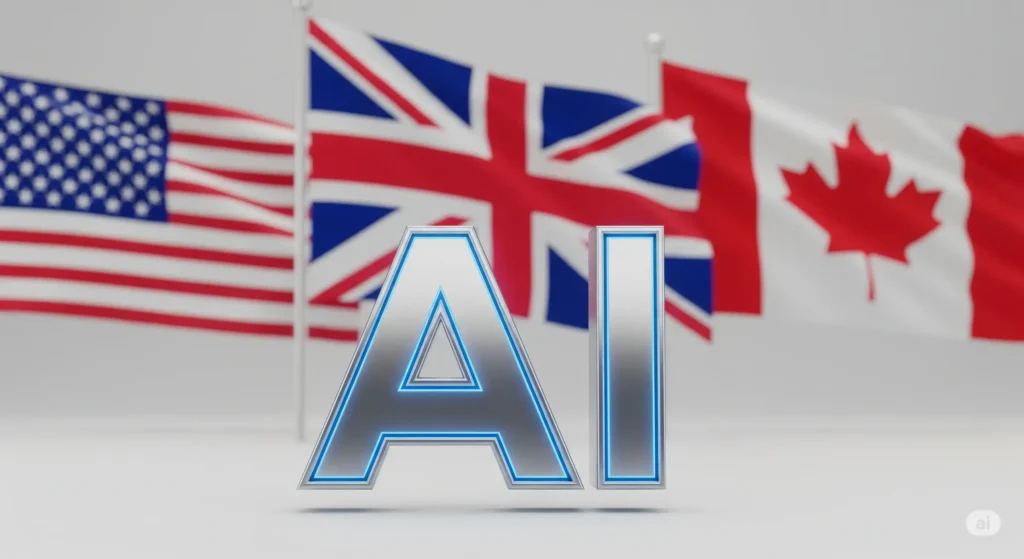
In 2023, over 75% of investment in the U.S. tech sector went to AI startups.
Artificial intelligence is reshaping almost everything, so regulation is the need of the hour. has become urgent. The U.S., UK, and Canada are all focusing on flexible principles and aiming for safety-first oversight. Each country is making laws that will impact in better ways for businesses and investors.
Let’s dig into the article to check out the technology regulation in these countries.
AI Laws In the USA, UK, and Canada
Since technology is here to stay, we need some specific regulations for the ethical use of it. Some of the major policies set for AI by USA, UK, and Canada are:
- The Colorado AI Act Of 2024
This law will start from February 1, 2026. Any company or person who creates a high-risk artificial intelligence (AI) system must take reasonable steps to protect people from any known or likely risks of algorithmic discrimination, meaning unfair treatment caused by the AI.
The law says that if the developer follows certain steps, it will be assumed they acted responsibly. These steps include:
- Share key information about the AI system with those using it.
- Provide details needed for risk assessments.
- Publicly list the high-risk systems they’ve built or changed, and how they manage related risks.
- Report any known or likely discrimination risks to the attorney general and system users within 90 days of discovery.
This law makes it clear that developers of high-risk AI must act with care and honesty to protect the public and reduce harm.
- Illinois Supreme Court AI Policy
The Illinois Supreme Court supports using AI in courts but wants to make sure it is done safely, fairly, and ethically.
AI can help improve court efficiency and access to justice. But it also raises concerns about accuracy, fairness, and the truthfulness of evidence and court decisions. Courts must be careful to avoid AI mistakes that could harm people’s rights or make the system unfair. The steps include:
- People like judges, lawyers, clerks, and even those representing themselves can use AI tools, but they are fully responsible for what they submit.
- AI use must follow all legal and ethical rules.
- Users must check AI-generated content carefully to make sure it’s correct and does not include false or biased information.
- There is no need to say in court filings if AI was used, but AI must not be used in ways that break privacy laws or share sensitive information.
The court will keep updating this policy as AI technology changes. Judges will always be responsible for their final decisions, no matter how much tech is involved. Education about AI will also be supported to help everyone use it properly.
- UK’s Central Function to Support AI Regulation
AI affects many areas, so no single regulator can manage its risks and benefits alone. To help with this, the UK government has created a new team within the Department for Science, Innovation and Technology (DSIT). This team, called the Central Function, will:
- Keep track of AI risks
- Help different regulators work together
- Find and fix gaps in existing rules
Some of its main tasks include reviewing current laws, building a list of AI-related risks across industries, and working with groups like the Digital Regulation Cooperation Forum (DRCF).
This team will also set up a steering group with members from the government and key regulators to guide its work. The success of the UK’s AI rules will depend on how well this team brings consistency, cooperation, and clear guidance for businesses using AI.
- AIDA Act Of Canada
The Artificial Intelligence and Data Act (AIDA) is a proposed law in Canada that is designed to protect Canadians, support the responsible development of AI, and promote Canadian values and businesses in the global AI space.
AIDA takes a risk-based approach to AI, meaning the rules will be stricter for AI systems that could have a bigger impact on people. Its definitions and rules are designed to match international standards. The steps include:
- High-risk AI systems must respect human rights and safety, just like any other product or service in Canada.
- The government will consult experts, companies, and the public to decide which AI systems are considered “high-impact” and what rules they must follow.
- The Minister of Innovation, Science, and Industry will oversee AIDA. A new AI and Data Commissioner will help guide and enforce the rules. At first, this office will focus on education, but later it will help with rule enforcement too.
- AIDA will introduce new criminal laws to stop the reckless or harmful use of AI that could seriously hurt people or their rights.
- Companies using powerful AI systems in trade between provinces or other countries will have clear responsibilities. AIDA identifies what activities during an AI system’s life need oversight and sets rules to manage the risks.
Conclusion
These laws like set by the government and judiciary, have been implemented to lower the risk that will be done by the AI.
These new regulations are not stopping AI progress; they are just meant to guide it in a direction that protects people and ensures fairness. AI can work better with clear rules, transparency, and accountability.
Do you want to learn more about AI news 2025? Tell us in the comments below.
FAQs
Q1: What is the AI Regulation 2025?
Ans: The AI regulation law of 2025 includes are Colorado AI Act (2026), the Illinois Supreme Court Policy on Artificial Intelligence (2025), the UK AI Regulation Framework and Central Function (2024), and Canada’s Artificial Intelligence and Data Act (AIDA)
Q2: Is AI going to be regulated?
Ans: AI usage is being regulated by new laws in the UK, the U.S.A., and Canada.

